|
Books Should Be Free Loyal Books Free Public Domain Audiobooks & eBook Downloads |
|
|
Books Should Be Free Loyal Books Free Public Domain Audiobooks & eBook Downloads |
|
Non-fiction |
|---|
|
Book type:
Sort by:
View by:
|
By: Hilaire Belloc | |
|---|---|
 First and Last
First and Last
“When a man weighs anchor in a little ship or a large one he does a jolly thing! He cuts himself off and he starts for freedom and for the chance of things. He pulls the jib a-weather, he leans to her slowly pulling round, he sees the wind getting into the mainsail, and he feels that she feels the helm. He has her on a slant of the wind, and he makes out between the harbour piers.” (quotation from Hilaire Belloc) | |
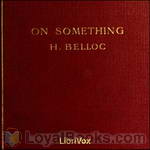 On Something
On Something
“Now that story is a symbol, and tells the truth. We see some one thing in this world, and suddenly it becomes particular and sacramental; a woman and a child, a man at evening, a troop of soldiers; we hear notes of music, we smell the smell that went with a passed time, or we discover after the long night a shaft of light upon the tops of the hills at morning: there is a resurrection, and we are refreshed and renewed.” – Hilaire Belloc | |
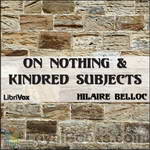 On Nothing & Kindred Subjects
On Nothing & Kindred Subjects
“I knew a man once, Maurice, who was at Oxford for three years, and after that went down with no degree. At College, while his friends were seeking for Truth in funny brown German Philosophies, Sham Religions, stinking bottles and identical equations, he was lying on his back in Eynsham meadows thinking of Nothing, and got the Truth by this parallel road of his much more quickly than did they by theirs; for the asses are still seeking, mildly disputing, and, in a cultivated manner, following the... | |
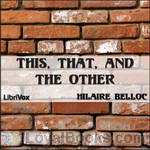 This, That, and the Other
This, That, and the Other
“When Fame comes upon a man well before death then must he most particularly beware of it, for is it then most dangerous. Neither must he, having achieved it, relax effort nor (a much greater peril) think he has done his work because some Fame now attaches thereto.” -- Hilaire Belloc | |
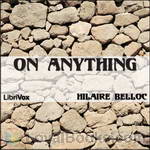 On Anything
On Anything
"Long before I knew that the speech of men was misused by them and that they lied in the hearing of the gods perpetually in those early days through which all men have passed, during which one believes what one is told, an old and crusty woman of great wealth, to whom I was describing what I intended to do with life (which in those days seemed to me of infinite duration), said to me, ( You are building castles in Spain.' I was too much in awe of this woman not on account of the wealth, but on account... | |
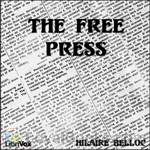 The Free Press
The Free Press
I propose to discuss in what follows the evil of the great modern Capitalist Press, its function in vitiating and misinforming opinion and in putting power into ignoble hands; its correction by the formation of small independent organs, and the probably increasing effect of these last. (Introduction by Hilaire Belloc) | |
By: Hippolyte Dreyfus-Barney (1873-1928) | |
|---|---|
 The Universal Religion: Bahaism - Its Rise and Social Import
The Universal Religion: Bahaism - Its Rise and Social Import
“Bahaism is not a new religion,” writes Hippolyte Dreyfus-Barney, “It is religion renewed… it does not pretend to represent the whole Truth; on the contrary, it recognises Truth in fundamental principles which are the basis of all former dispensations, and which for that very reason form the standpoint of concord too long lost sight of. And it requires people to renounce ancient superstitions, to abandon the dead letter in order to be penetrated by the living and vivifying spirit, then by... | |
By: Hippolytus of Rome (170-235) | |
|---|---|
 Treatise on Christ and Antichrist
Treatise on Christ and Antichrist
In this late second century treatise, Hippolytus gives an excellent summary of Early Christian thinking on the subject of the antichrist. Familiar texts from Daniel and Revelation are treated together with his own current events to give a unique perspective. (Summary by Jonathan Lange) | |
By: Hiram Bingham (1875-1956) | |
|---|---|
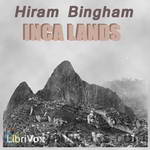 Inca Lands
Inca Lands
Prof. Hiram Bingham of Yale Makes the Greatest Archaeological Discovery of the Age by Locating and Excavating Ruins of Machu Picchu on a Peak in the Andes of Peru.There is nothing new under the sun, they say. That is only relatively true. Just now, when we thought there was practically no portion of the earth's surface still unknown, when the discovery of a single lake or mountain, or the charting of a remote strip of coast line was enough to give a man fame as an explorer, one member of the daredevil explorers' craft has "struck it rich... | |
 Explorer in the Air Service
Explorer in the Air Service
Explorer Hiram Bingham discovered Machu Picchu in 1911, as recounted in his book Inca Lands, now released on Librivox at http://librivox.org/inca-lands-by-hiram-bingham/. In 1917, he became an aviator and organized the United States Schools of Military Aeronautics at eight universities to provide ground school training for aviation cadets, and then in Issoudun, France, Bingham commanded the primary Air Service flying school. He became a supporter of the Air Service in their post-war quest for independence from the Army and supported that effort, in part, with the publication of this book of his wartime experiences published in 1920 by Yale University Press. | |
By: Hiram Chase | |
|---|---|
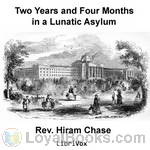 Two Years and Four Months in a Lunatic Asylum
Two Years and Four Months in a Lunatic Asylum
Hiram Chase is a well liked Reverend in a small ministry in Utica. When his mental and physical health deteriorates, he is taken to Utica lunatic asylum. After his stay in the asylum, Hiram documents his experiences and those of other patients in the asylum. He describes his daily routine and the negative experiences he had, along with praising certain individuals whom he met during his "Two Years and Four Months in a Lunatic Asylum". | |
By: Holland Thompson (1873-1940) | |
|---|---|
 The Age of Invention : a chronicle of mechanical conquest
The Age of Invention : a chronicle of mechanical conquest
| |
By: Horatio Barber (1875-1964) | |
|---|---|
 The Aeroplane Speaks Fifth Edition
The Aeroplane Speaks Fifth Edition
| |
By: Horatio Nelson | |
|---|---|
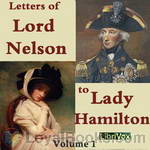 The Letters of Lord Nelson to Lady Hamilton
The Letters of Lord Nelson to Lady Hamilton
Horatio Nelson, 1st Viscount Nelson, 1st Duke of Bronté, KB (29 September 1758 – 21 October 1805) was an English flag officer famous for his service in the Royal Navy, particularly during the Napoleonic Wars. He won several victories, including the Battle of Trafalgar in 1805, during which he was killed. These are the letters that he wrote to Lady Hamilton, with whom he was having a notorious affair until his death in 1805. | |
By: Horatius Bonar (1808-1889) | |
|---|---|
 Everlasting Righteousness
Everlasting Righteousness
... or How Shall Man Be Just with God?How does salvation work? How does a righteous God declare an unrighteous person to be righteous in His sight? In this comprehensive and devotional study of justification by faith alone in the Person and work of the Lord Jesus Christ, Horatius Bonar answers these questions in a clear and wonderful way. Bonar has been called the prince of Scottish hymn writers. Quoting one of the 600 hymns he wrote, here is "righteous peace securely made" Additional proof-listening by Kimberly Krause. | |
By: Hubert E. (Hubert Edwin) Collins (1872-1932) | |
|---|---|
 Steam Turbines A Book of Instruction for the Adjustment and Operation of the Principal Types of this Class of Prime Movers
Steam Turbines A Book of Instruction for the Adjustment and Operation of the Principal Types of this Class of Prime Movers
| |
By: Hugh M. (Hugh McCormick) Smith (1865-1941) | |
|---|---|
 The Salmon Fishery of Penobscot Bay and River in 1895-96
The Salmon Fishery of Penobscot Bay and River in 1895-96
| |
By: Hugh Miller (1802-1856) | |
|---|---|
 Leading Articles on Various Subjects
Leading Articles on Various Subjects
| |
By: Hugh Tempest Sheringham (1879-1930) | |
|---|---|
 Angler's Hours
Angler's Hours
One of the classic British books about angling. The author’s love was fly fishing—“…while there are trout, life is worth living…” but he was no snob. An Angler’s Hours includes several chapters about coarse fishing as well as a surprising account of the Japanese tenkara method as used in England. Sheringham's style is similar to that of the much-loved B.B. with a dash of P.G. Wodehouse. He doesn’t bore us with technical details but writes of the simple joys of angling—"a man who gazes at the wares in a tackle-shop on a sunny day in April has certainly a fishing expedition in prospect”—not forgetting the pleasure of a nice pot of tea at the end of the day... | |
By: Hugh Walpole (1884-1941) | |
|---|---|
 Joseph Conrad
Joseph Conrad
This is a literary biography of Joseph Conrad (1857 – 1924) who is regarded as one of the greatest novelists in English. He was granted British nationality in 1886, but always considered himself a Pole. Though he did not speak English fluently until he was in his twenties (and always with a marked accent), he was a master prose stylist who brought a distinctly non-English sensibility into English literature. He wrote stories and novels, many with a nautical setting, that depict trials of the human spirit... | |
 Jeremy And Hamlet: A Chronicle Of Certain Incidents In The Lives Of A Boy, A Dog, And A Country Town
Jeremy And Hamlet: A Chronicle Of Certain Incidents In The Lives Of A Boy, A Dog, And A Country Town
Hamlet is Jeremy’s dog. This 1923 book is Hugh Walpole’s second volume in his Jeremy semi-autobiographical trilogy , Jeremy at Crale ), about a ten-year-old English boy. One commentator wrote this of the first book: “With affectionate humor, Mr. Walpole tells the story of Jeremy and his two sisters, Helen and Mary Cole, who grow up in Polchester, a quiet English Cathedral town…. Mr. Walpole has given his narrative a rare double appeal, for it not only recreates for the adult the illusion of his own happiest youth, but it unfolds for the child-reader a genuine and moving experience with real people and pleasant things... | |
By: Hugo Münsterberg (1863-1916) | |
|---|---|
 Psychotherapy
Psychotherapy
Talking about viewing the Ocean "If I take the attitude of appreciation, it would be absurd to say that this wave is composed of chemical elements which I do not see; and if I take the attitude of physical explanation, it would be equally absurd to deny that such elements are all of which the wave is made. From the one standpoint, the ocean is really excited; from the other standpoint, the molecules are moving according to the laws of hydrodynamics. If I want to understand the meaning of this scene every reminiscence of physics will lead me astray; if I want to calculate the movement of my boat, physics alone can help me".(from the Introduction) | |
By: Hugo Ziemann | |
|---|---|
 The Whitehouse Cookbook (1887) Cooking, Toilet and Household Recipes, Menus, Dinner-Giving
The Whitehouse Cookbook (1887) Cooking, Toilet and Household Recipes, Menus, Dinner-Giving
| |
By: Ida Coe and Alice Christie (1876-?) | |
|---|---|
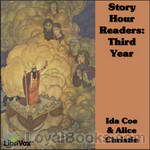 Story Hour Readers: Third Year
Story Hour Readers: Third Year
Short and sweet stories for children from the 19th century. The stories were compiled by two New York City teachers and were thought appropriate for third year children at that time. | |
By: Ida Dandridge Bennett | |
|---|---|
 The Vegetable Garden: A Manual for the Amateur Vegetable Gardener
The Vegetable Garden: A Manual for the Amateur Vegetable Gardener
This book is a good reference on vegetable gardening. It covers the economic value of a vegetable garden, planning and locating the garden, maintaining soil fertility, hotbeds, garden tools, sowing seeds, transplanting seedlings, growing and storing vegetables, managing garden pests, and fall garden work. | |
 The Flower Garden: A Handbook of Practical Garden Lore
The Flower Garden: A Handbook of Practical Garden Lore
This book is a good reference on the perennial flower gardening and landscaping. It contains information on growing the plants from seed and explains how to grow and care for the traditional garden flowering plants, bulbs, trees, and shrubs. There are sections covering all aspects of ornamental gardens including water gardens and caring for house plants in the winter. The author has lots of unexpected but good advice in her chapter of Don’ts, for example: "Don’t supply with cut flowers, plants... | |
By: Ida Laura Pfeiffer | |
|---|---|
 A Visit to the Holy Land, Egypt, and Italy
A Visit to the Holy Land, Egypt, and Italy
Ida Pfeiffer travelled alone in an era when women didn’t travel. She went first on a pilgrimage to the Holy Land, then went on to Egypt and Italy. Understanding the difficulties a woman would face travelling alone and on a budget, she made a will before she left. Go she did, however; and upon her return she wrote this book. She used the proceeds to finance her next trip – six months in Iceland. | |
By: Ida M. Tarbell (1857-1944) | |
|---|---|
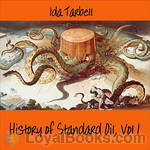 The History of Standard Oil: Volume 1
The History of Standard Oil: Volume 1
The History of the Standard Oil Company is a book written by journalist Ida Tarbell in 1904. It was an exposé of the Standard Oil Company, run at that time by oil tycoon John D. Rockefeller the richest figure in America's history. Originally serialized in 19 parts in McClure's magazine, the book was a seminal example of muckraking, and inspired many other journalists to write about trusts, large businesses that (in the absence of strong antitrust law in the 19th century) attempted to gain monopolies in various industries... | |
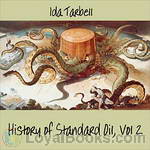 The History of Standard Oil: Volume 2
The History of Standard Oil: Volume 2
The History of the Standard Oil Company is a book written by journalist Ida Tarbell in 1904. It was an exposé of the Standard Oil Company, run at that time by oil tycoon John D. Rockefeller, the richest figure in America's history. Originally serialized in 19 parts in McClure's magazine, the book was a seminal example of muckraking, and inspired many other journalists to write about trusts, large businesses that (in the absence of strong antitrust law in the 19th century) attempted to gain monopolies in various industries. The History of the Standard Oil Company was credited with hastening the breakup of Standard Oil, which came about in 1911. | |
By: Ike Matthews | |
|---|---|
 Full Revelations of a Professional Rat-catcher
Full Revelations of a Professional Rat-catcher
Full Revelations of a Professional Rat-Catcher, after 25 Years' ExperienceBy Ike Matthews. INTRODUCTION. In placing before my readers in the following pages the results of my twenty-five years' experience of Rat-catching, Ferreting, etc., I may say that I have always done my best to accomplish every task that I have undertaken, and I have in consequence received excellent testimonials from many corporations, railway companies, and merchants. I have not only made it my study to discover the different... | |
By: Immanuel Kant (1724-1804) | |
|---|---|
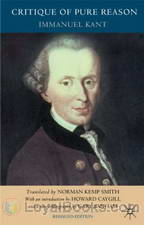 The Critique of Pure Reason
The Critique of Pure Reason
The Critique of Pure Reason, first published in 1781 with a second edition in 1787, has been called the most influential and important philosophical text of the modern age. Kant saw the Critique of Pure Reason as an attempt to bridge the gap between rationalism (there are significant ways in which our concepts and knowledge are gained independently of sense experience) and empiricism (sense experience is the ultimate source of all our concepts and knowledge) and, in particular, to counter the radical empiricism of David Hume (our beliefs are purely the result of accumulated habits, developed in response to accumulated sense experiences)... | |
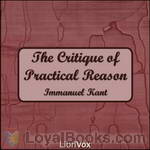 The Critique of Practical Reason
The Critique of Practical Reason
The Critique of Practical Reason (Kritik der praktischen Vernunft) is the second of Immanuel Kant’s three critiques, first published in 1788. It follows on from his Critique of Pure Reason and deals with his moral philosophy. The second Critique exercised a decisive influence over the subsequent development of the field of ethics and moral philosophy, becoming the principle reference point for ethical systems that focus on the rightness or wrongness of actions themselves, as opposed to the rightness or wrongness of the consequences of those actions... | |